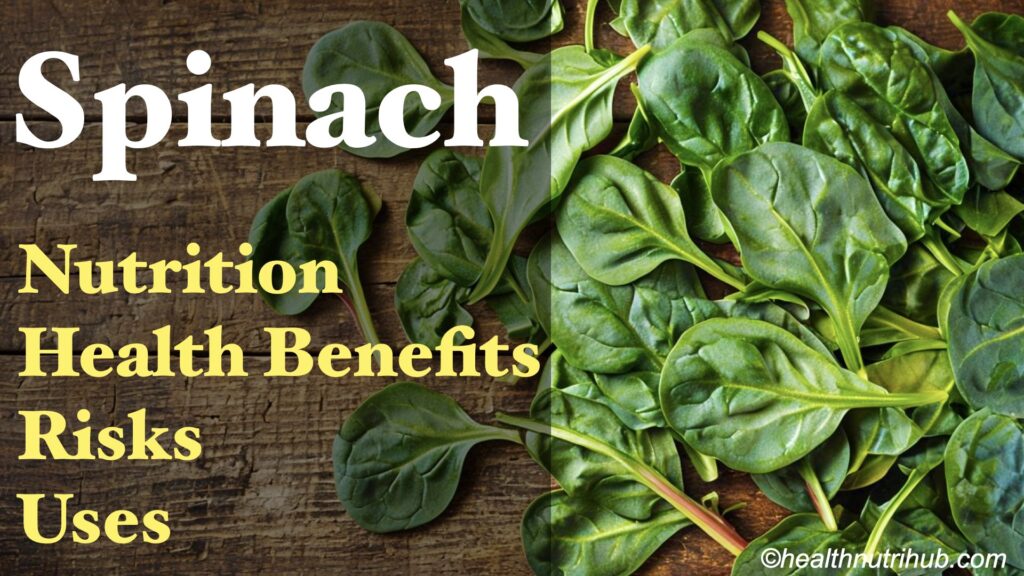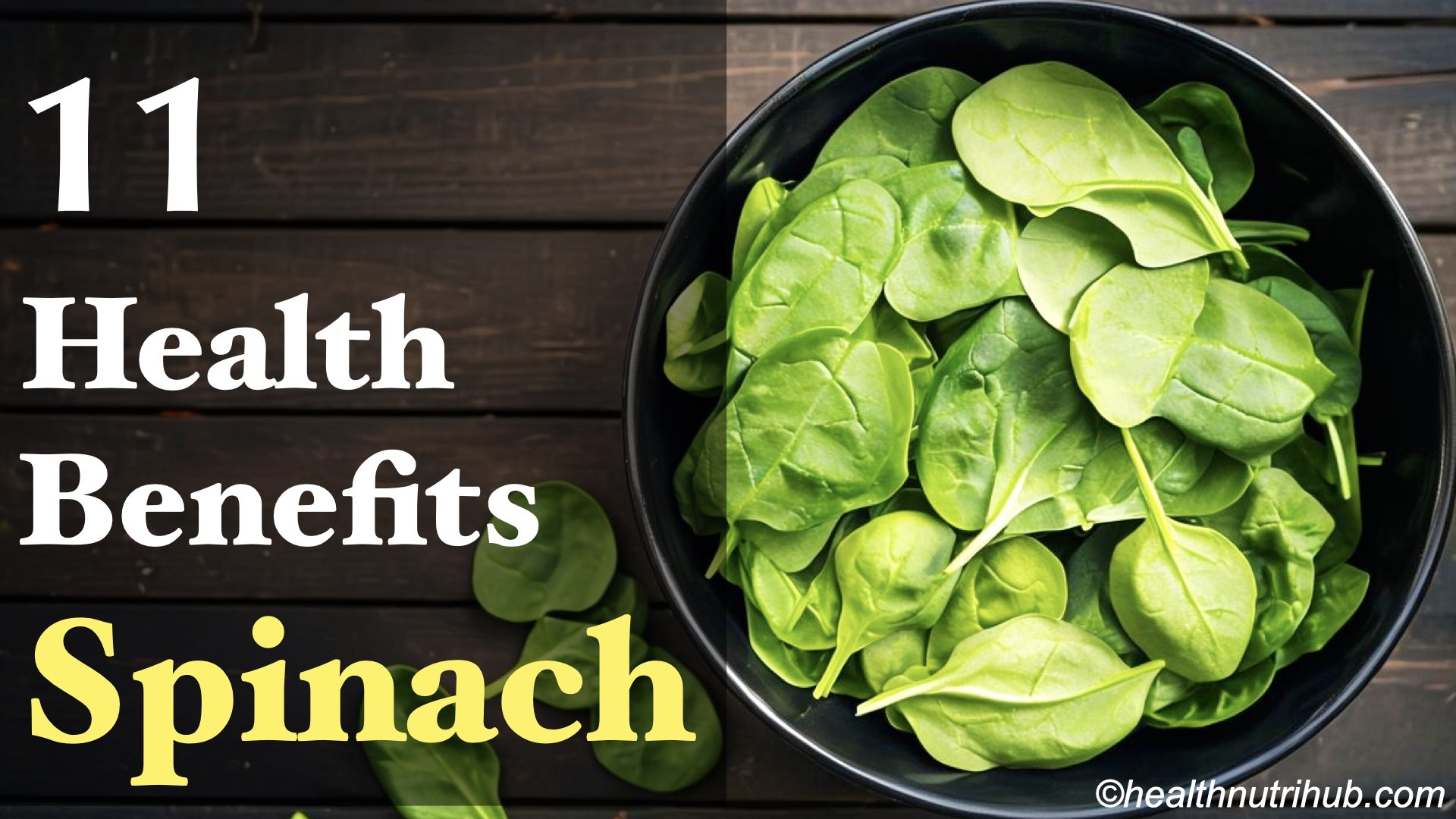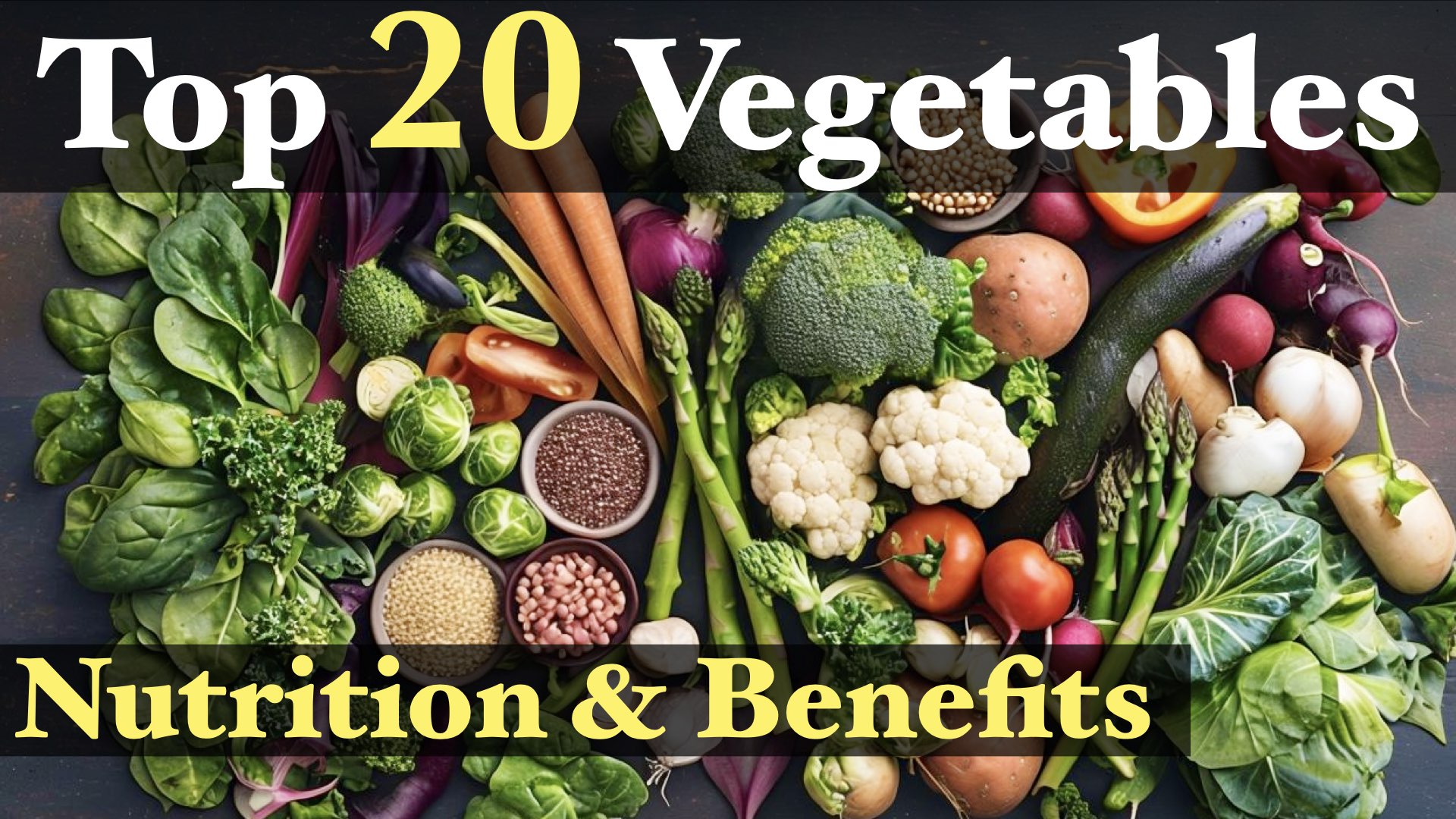Introduction to Spinach
Spinach is a versatile leafy green vegetable that has a rich nutritional profile and numerous health benefits. Belonging to the Amaranthaceae family, spinach (Spinacia oleracea) is native to Persia and has been a staple in various cuisines around the world. Spinach can be consumed raw and cooked, making it a popular ingredient in various dishes. As a superfood known for its numerous benefits, spinach is a go-to option for those seeking a wholesome ingredient that supports overall well-being.
Important ‘Fruits & Veggies’ and Their Health Benefits
Nutritional Profile of Spinach
Spinach is a nutritional powerhouse, packed with essential nutrients that support overall health. Here’s a breakdown of its key nutritional components:
Macronutrients:
-
Low in Calories: Spinach is incredibly low in calories, making it an excellent choice for weight management.
- High in Fiber: It contains dietary fiber, helping in digestion and helping to maintain a healthy bowel system.
- Protein Content: Spinach provides plant-based protein, which is crucial for muscle growth and repair.
Vitamins and Minerals:
- Rich in Vitamin A: Spinach is loaded with beta-carotene, which the body converts to vitamin A, promoting good vision and skin health.
- Vitamin C Source: This vitamin acts as a powerful antioxidant and supports a robust immune system.
- Vitamin K Abundance: Essential for bone health and blood clotting.
- Folate (Vitamin B9): Particularly important for pregnant women as it supports fetal development and reduces the risk of neural tube defects.
- Iron: Spinach is a plant-based source of iron, vital for red blood cell production and energy metabolism.
- Calcium Content: Supports strong bones, though the bioavailability is lower compared to dairy products.
- Magnesium and Potassium: These minerals play a critical role in maintaining muscle and nerve function.
Health Benefits of Spinach
Spinach is a powerhouse of nutrients that offers a multitude of health benefits. This leafy green is common in salads and smoothies boost your overall health in various ways.
Antioxidant Properties
- Spinach is loaded with antioxidants which help fight oxidative stress in the body.
- Key antioxidants like beta-carotene, lutein, and zeaxanthin are present, promoting eye health and reducing the risk of chronic diseases.
Heart Health
- Spinach is rich in nitrates, which help improve blood flow and reduce blood pressure.
- The presence of potassium in spinach supports heart health by balancing the negative effects of sodium.
Bone Health
- Spinach is an excellent source of Vitamin K, essential for bone mineralization.
- It also contains calcium and magnesium, contributing to strong and healthy bones.
Digestive Health
- High in dietary fiber, spinach aids in healthy digestion and prevents constipation.
- Eating spinach regularly can promote a healthy gut and enhance nutrient absorption.
Immune Support
- Packed with vitamins A and C, spinach strengthens the immune system.
- These nutrients help protect against infections and boost the body’s ability to fight illnesses.
Weight Management
- Spinach is low in calories yet high in fiber, which can help you feel full and satisfied, making it a great option for those looking to manage their weight.
- The fiber content helps reduce hunger cravings by promoting a feeling of satiety.
Blood Sugar Regulation
- Spinach contains compounds like alpha-lipoic acid that have been shown to lower blood sugar levels.
- Its high fiber content also helps in slowing down the digestion of carbohydrates, leading to more stable blood sugar levels.
Skin Health
- Rich in vitamins A and C, spinach is beneficial for maintaining healthy skin.
- These vitamins help promote collagen production, keeping skin smooth and vibrant.
Anti-Inflammatory Properties
- The presence of compounds like neoxanthin and violaxanthin provides anti-inflammatory benefits.
- Regular consumption can help reduce inflammation-related diseases.
Mental Health Support
- Spinach contains folate, which is crucial for brain health and may reduce the risk of depression.
- The antioxidants in spinach also help fight oxidative stress, which is linked to cognitive decline.
Top 11 Health Benefits of Spinach: Top-Ranked Superfood
Benefits of Spinach for Pregnant Women
- Rich in Folic Acid: Spinach is packed with folic acid, crucial for reducing the risk of neural tube defects in developing babies.
- Iron Boost: The high iron content helps prevent anemia by supporting increased blood volume during pregnancy.
- Supports Eye Health: Vitamins A and carotenoids in spinach contribute to healthy vision for both mother and child.
- Hormone Regulation: Magnesium and vitamins in spinach help regulate hormones and reduce common pregnancy discomforts.
- Fiber for Digestion: The high fiber content helps digestion and get rid off constipation, a common pregnancy issue.
Benefits of Spinach for Children
- Bone Strength: Spinach provides calcium and vitamin K, essential for developing strong and healthy bones.
- Cognitive Development: Nutrients like iron and vitamin E extend benefits to cognitive function, supporting learning and memory.
- Immune Support: Rich in vitamin C and antioxidants, spinach boosts children’s immune systems.
- Healthy Vision: The presence of lutein supports eye health, reducing the risk of future vision problems.
- Metabolism and Energy: Spinach plays a role in healthy metabolic function, providing sustained energy levels.
Benefits of Spinach for Elderly Men
- Bone Health Maintenance: Offers calcium and vitamin K to help maintain bone density and fights osteoporosis.
- Cardiovascular Benefits: Potassium and nitrates promote heart health by helping regulate blood pressure and reducing cardiovascular risk.
- Improves Cognitive Function: Antioxidants like lutein and beta-carotene may slow cognitive decline associated with aging.
- Anti-Inflammatory Properties: Spinach contains anti-inflammatory compounds that can reduce arthritis symptoms.
- Vision Support: With nutrients like lutein and zeaxanthin, spinach helps protect against age-related macular degeneration.
Benefits of Spinach for Athletes
- Increased Energy Levels: Provides iron and chlorophyll which aid red blood cell production, enhancing stamina.
- Enhanced Muscle Efficiency: The natural nitrates in spinach can improve muscle oxygenation, boosting performance.
- Rapid Recovery: Vitamin C and magnesium support muscle recovery and reduce post-exercise soreness.
- Hydration Support: As spinach is high in water content, it contributes to proper hydration.
- Nutritional Density: Contains essential vitamins and minerals that complement high-energy diets needed for training.
Spinach Risks and Considerations
While spinach is packed with beneficial nutrients, it’s important to be aware of certain risks and considerations associated with its consumption.
Oxalates and Kidney Stones:
- Spinach contains high levels of oxalates, which can contribute to the formation of kidney stones in susceptible individuals.
- To minimize risk, drink plenty of water and limit spinach intake if you are prone to kidney stones.
Allergic Reactions:
- Although rare, some people may experience allergic reactions to spinach, including symptoms like itching or swelling.
- Consult a healthcare provider if you suspect an allergy.
Interaction with Medications:
- Spinach is high in vitamin K, which plays a role in blood clotting. This can interfere with blood-thinning medications like warfarin.
- If you are on such medications, maintain a consistent intake of vitamin K and discuss any dietary changes with your doctor.
Goitrogens and Thyroid Health:
- Spinach contains goitrogens, compounds that may interfere with thyroid function by hindering iodine uptake.
- Cooking spinach can reduce goitrogen levels, making it safer for those with thyroid issues.
Pesticide Residues:
- Conventionally grown spinach may contain pesticide residues. Opt for organic varieties when possible to reduce exposure.
Culinary Uses and Recipes
Spinach is a versatile leafy green that can be easily incorporated into a variety of dishes, offering a nutritious boost without a lot of hassle.
Raw vs. Cooked Spinach
- Raw Spinach: Spinach can be eaten raw, providing a crunchy texture and a mildly sweet flavor. It is perfect for salads, sandwiches, and smoothies.
- Cooked Spinach: Cooking spinach helps to release more nutrients, such as calcium and iron, making them more bioavailable. It also reduces oxalate content, which can interfere with mineral absorption.
Spinach in Salads and Smoothies
- Spinach Salads: Fresh spinach leaves make an excellent base for salads. Combine with fruits like strawberries and nuts for added flavor and nutrition.
- Spinach Smoothies: Add a handful of spinach to your favorite smoothie recipes. It blends well with fruits like bananas and berries, providing a nutrient-rich beverage that’s perfect for breakfast or a midday snack.
Cooking Tips for Maximum Nutrient Retention
- Quick Sautéing: Lightly sauté spinach with olive oil, garlic, and a pinch of salt for a delicious and nutrient-packed side dish. This method preserves taste and nutrients.
- Steaming: Steam spinach for a few minutes to retain its green color and essential nutrients. Steaming minimizes nutrient loss compared to boiling.
- Adding to Soups and Stews: Incorporate fresh or frozen spinach in soups and stews. It cooks quickly and adds a boost of vitamins without overpowering the dish.
- Spinach in Omelets and Quiches: Use spinach as a filling in omelets and quiches. It’s an excellent way to add flavor and nutrition to your meals.
Conclusion
Spinach is a nutrient-rich leafy green that offers numerous health benefits for people of all ages. Whether you’re pregnant, elderly, or simply aiming for a healthier lifestyle, incorporating spinach into your diet can contribute positively to your overall well-being. However, be mindful of its potential risks, such as oxalate content, especially if you have specific health conditions. With its versatility in culinary uses, spinach can easily be included in meals, making it an essential part of a balanced diet.
FAQ – Frequently Asked Question about Spinach
Below are few of the frequently asked question about spinach.
What are the main health benefits of spinach?
Spinach offers numerous health benefits, including improved heart health, enhanced bone strength, and boosted immune function, thanks to its high content of vitamins, minerals, and antioxidants like vitamin K and iron.
Can spinach be eaten every day?
Yes, spinach can be consumed daily as part of a balanced diet. Its rich nutrient profile supports overall health, but it is essential to vary your leafy greens to prevent overconsumption of oxalates.
Is raw spinach better than cooked spinach?
Both raw and cooked spinach have unique benefits. Raw spinach retains more vitamin C, while cooking enhances the absorption of nutrients like vitamin A and iron by breaking down oxalates.
Does spinach help in weight loss?
Spinach is low in calories and high in fiber, making it an excellent addition to weight-loss diets by promoting fullness and reducing overall calorie intake.
How can pregnant women benefit from eating spinach?
Pregnant women can benefit from spinach due to its folate content, which is vital for fetal development. Consuming adequate folate can help prevent neural tube defects.
Are there any risks associated with eating spinach?
While spinach is generally safe, high oxalate levels can contribute to kidney stones in susceptible individuals. Moderation and combining with vitamin C sources can mitigate risks.
How should spinach be stored for maximum freshness?
To keep spinach fresh, store it in a zip-lock bag or airtight container with a paper towel in the refrigerator. Consume within a few days for optimal freshness and nutrition.
Can spinach be used in smoothies?
Yes, spinach is a popular smoothie ingredient. It blends well with fruits and yogurt, adding nutrition without altering the taste significantly.
Is spinach safe for babies?
Spinach can be introduced to babies around 8-10 months of age. It should be cooked and pureed to reduce nitrate content and ensure easy digestion.
How does spinach benefit elderly individuals?
Elderly individuals benefit from spinach’s nutrients like calcium and vitamin K, which support bone health, and antioxidants that aid in reducing age-related oxidative stress.
Can spinach interfere with medications?
Yes, spinach’s high vitamin K content can interfere with blood thinners like warfarin. Consult your healthcare provider before consumption if you are on such medications.
Is spinach good for athletes?
Spinach is excellent for athletes due to its rich iron content, supporting oxygen transport and energy levels, and its antioxidants that help reduce exercise-induced inflammation.
Can you eat spinach if you have a thyroid condition?
Spinach contains goitrogens, which can interfere with thyroid function in large amounts. Cooked spinach reduces goitrogen content, making it safer for those with thyroid concerns.
What vitamins and minerals are abundant in spinach?
Spinach is rich in vitamins A, C, K, and folate, as well as minerals like iron, calcium, and magnesium, contributing to its myriad health benefits.
How can spinach help digestive health?
Spinach’s high fiber content aids in promoting satiety, regular bowel movements, and overall digestive health, helping prevent constipation.
What are some easy recipes incorporating spinach?
Easy recipes include spinach salads, spinach and egg omelets, sautéed spinach with garlic, spinach smoothies, and creamy spinach dips.
How can you cook spinach to preserve its nutrients?
To preserve nutrients, cook spinach quickly using methods like steaming or sautéing with minimal water. This helps retain vitamins and minerals.
Is organic spinach better than conventional spinach?
Organic spinach may have fewer pesticide residues compared to conventional spinach. It is often considered a better choice for those concerned about chemical exposure.
Can you freeze spinach for later use?
Yes, spinach can be frozen by blanching it briefly and then placing it in airtight bags. Frozen spinach works well in cooked dishes.
Reference
When writing about spinach and its nutritional benefits, it is essential to refer to credible sources to ensure accuracy and reliability. One such comprehensive resource is the USDA’s FoodData Central, which provides detailed information about the nutritional content of spinach. This data can be beneficial in understanding the specific vitamins and minerals found in spinach, helping to support the health claims made about this leafy green. For more information, you can visit the USDA FoodData Central.
Disclaimer: The information presented in this article is for educational purposes only and should not be considered medical advice. Always consult with a healthcare professional or a registered dietitian before making any significant changes to your diet, especially if you have underlying health conditions or are taking medication. Individual nutritional needs can vary, and professional guidance is essential to address specific health concerns and dietary requirements.




Pingback: Top 20 Healthy Vegetables: Nutrition & Health Benefits